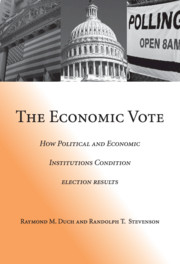Book contents
- Frontmatter
- Contents
- Preface
- 1 Introduction
- Part I Describing the Economic Vote in Western Democracies
- Part II A Contextual Theory of Rational Retrospective Economic Voting: Competency Signals
- 5 Competency Signals and Rational Retrospective Economic Voting
- 6 What Do Voters Know about Economic Variation and Its Sources?
- 7 Political Control of the Economy
- Part III A Contextual Theory of Rational Retrospective Economic Voting: Strategic Voting
- Part IV Conclusion and Summary
- Appendix A
- Appendix B
- Appendix C
- References
- Index
- Cambridge Cultural Social Studies
6 - What Do Voters Know about Economic Variation and Its Sources?
Published online by Cambridge University Press: 06 July 2010
- Frontmatter
- Contents
- Preface
- 1 Introduction
- Part I Describing the Economic Vote in Western Democracies
- Part II A Contextual Theory of Rational Retrospective Economic Voting: Competency Signals
- 5 Competency Signals and Rational Retrospective Economic Voting
- 6 What Do Voters Know about Economic Variation and Its Sources?
- 7 Political Control of the Economy
- Part III A Contextual Theory of Rational Retrospective Economic Voting: Strategic Voting
- Part IV Conclusion and Summary
- Appendix A
- Appendix B
- Appendix C
- References
- Index
- Cambridge Cultural Social Studies
Summary
Our explanation for contextual variation in economic voting assumes that voters know how much of the variation in random shocks to the economy is due to the competence of the government rather than the influences of nonelectorally dependent exogenous factors. By making this assumption, we were able to derive hypotheses about the way in which variation in the competency signal (and therefore voters' beliefs about this signal) likely impacts economic voting across countries and over time. Furthermore, in elaborating the meaning of the competency signal and thinking about what drives variation in it, we suggest a broad set of political and economic contexts that might systematically condition the magnitude of the signal (e.g., those that impact the relative number or importance of electorally versus nonelectorally dependent decision makers in economic policy making).
This chapter considers whether it is even reasonable to assume that voters have sensible beliefs about the variance in competence shocks to the economy. Or even about the total variation in shocks to the economy. Skepticism abounds in this respect and with good reason. Early efforts by Alesina and Rosenthal (1995) to demonstrate that fluctuations in the U.S. macro-economy might plausibly inform voters about incumbent competency suggested they did not. And even if they did, should we expect the typical voter to pay attention to and have informed beliefs about these signals?
- Type
- Chapter
- Information
- The Economic VoteHow Political and Economic Institutions Condition Election Results, pp. 148 - 177Publisher: Cambridge University PressPrint publication year: 2008

